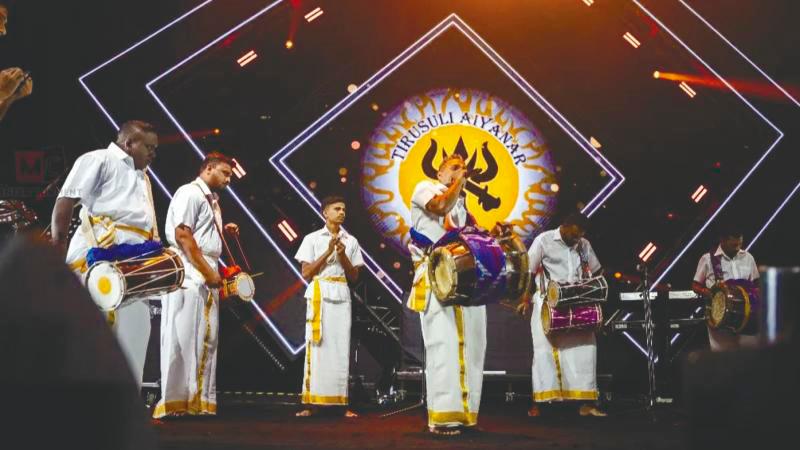THAIPUSAM is almost here! Every year, hundreds of thousands of Hindus gather at various temples across the country to celebrate Thaipusam. It is the second-largest festival after Deepavali.
Thaipusam attracts devotees who come to pay their respects to Lord Murugan. It is a colorful and devotional Hindu festival in which devotees pierce themselves with pins and spikes, hang pots and fruit from their chests with hooks, and pull chariots or people suspended from heavy rope attached to their backs by hooks.
And the beats of the urumi are perfect to set the tone for the festival! Accompanied by this devotional music filled with energy, every devotee is able to find the strength to make his or her way to the temple.
This instrument – a double-headed hourglass shaped drum held together by a pair of ropes and additional coils – is widely thought to be endowed with supernatural and sacred powers. Specific beats on the urumi are said to be able to induce spirit possession when played in religious ceremonies and processions.
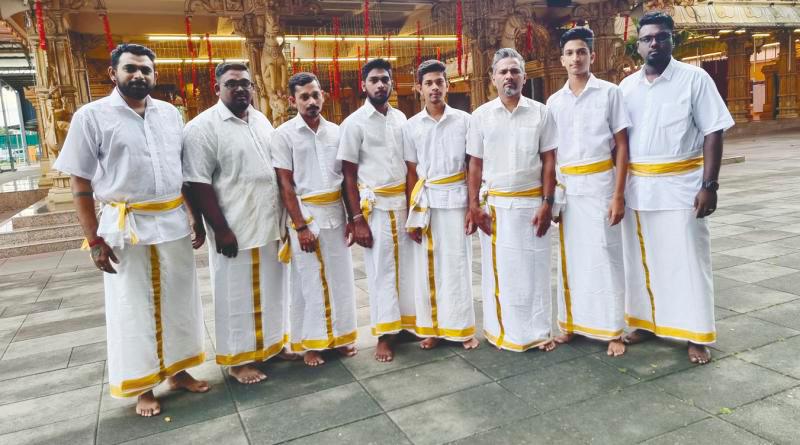
The urumi also gives its name to the urumi melam, an Indian folk music ensemble originating from the Indian state of Tamil Nadu. Members of the ensemble play the urumi with sticks while standing or walking, and are able to produce a variety of sounds such as drum strikes, rubbing, and “talking drum” sounds.
Urumi melam is frequently based on a fast-paced and repetitive rhythm. For basic ensembles, one to three urumi drums are usually used, along with other instruments such as the pambai (a pair of waist-worn two-headed drums) and nagaswaram (a traditional double-reed instrument).
The most common types of traditional urumi melam songs are devotional, trance, and funeral songs. Over the years, the genre has been expanded to more commercial uses, such as wedding songs and dances.
Recently, the Sun had the opportunity to speak with the leaders of two local urumi melam teams, in the lead up to the Thaipusam festival.
Tirusuli Aiyanar Urumi Melam is an urumi melam group founded in 1998 by Shyam Kumar, also known as 'Etta', and led by Dharshen, with team advisors Karthik and Saravanan.

The group originally started with eight people, and currently comprises 15 members from various locations, including Klang Valley, Ipoh and Johor Bahru.
We were intrigued by their decision to form an urumi melam group. For most of its members, the choice to perform this particular brand of music is a spiritual one.
“The vibes given by each of the instruments combined with our songs [touches] my heart,” Dharshen said. “And nothing can compare to the happiness it gives knowing we're giving our best to the Almighty Gods!
“Even better is knowing that this is our cultural music that has been passed down by our ancestors.”
The members of the group are not exactly new to the industry. Dharshen's own journey began in 1995 when he was a singer with a few other urumi groups, then he and a few others joined Tirusuli Urumi Melam just three years later.
There were several unique challenges in the beginning, as they each had to effectively 'start over' as a new group.
This included trying to source equipment and uniforms and to find the instruments such as thet urumi, thavil (barrel-shaped drum), pambai, and so on.
We asked Dharshen if the group experienced any particularly memorable moments during their long career of performances.
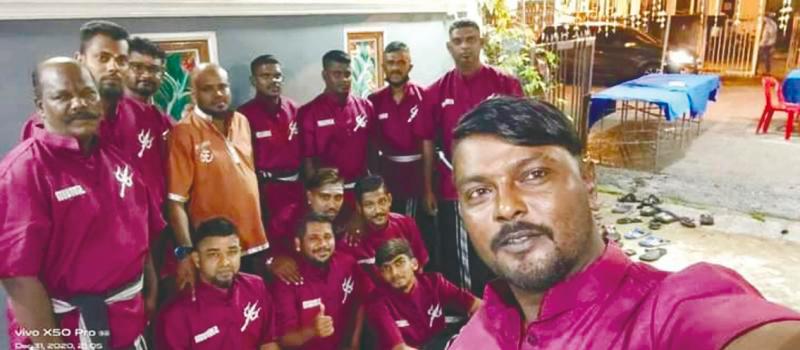
He replied: “There are a bunch of [memorable] moments for us. But at the top would be when we released our first album named Aiyanareh in 2000, where our official group name changed from Tirusuli Urumi Melam to Tirusuli Aiyanar Urumi Melam, which is what we are known by today.”
To date, they have released a total of 18 albums which feature songs composed by either their founder Etta, or Dharshen. There are also several songs which were composed by the group's singers.
One of their biggest hits is the track Tata Taitai , which was on their album Paandimuni , which was released during Thaipusam in 2014. The song, with vocals by Etta, is still popular among the community today, and is still requested during performances.
Among their biggest achievements as a group was when they performed for three days in the Pilgan Muniswaran Temple, Tiruchi, Tamil Nadu in April 2015. And recently the team performed at Anirudh's Once Upon A Time Tour which took place last September.
Dharshen added: “We as part of the entire Urumi Melam family are all equal. Each of us have been gifted different talents by God to bring out the best in us, and to offer it to God and all urumi melam lovers here. Let's not create a divide between us, but instead unite like a family.”
Their dream goal is to be able to sustain and make an impact on the cultural music scene, and to bring Urumi Melam to future generations. The next generation must continue to value cultural traditions and carry on the legacy of the evergreen legends.
“Let's not just depend on digitized music albums but also go with live performance with songs and drums to get the original vibes. Soon, a new song, Radhe Krishna , will be released on our YouTube channel, and a few more Urumi Melam single tracks are in the works.”
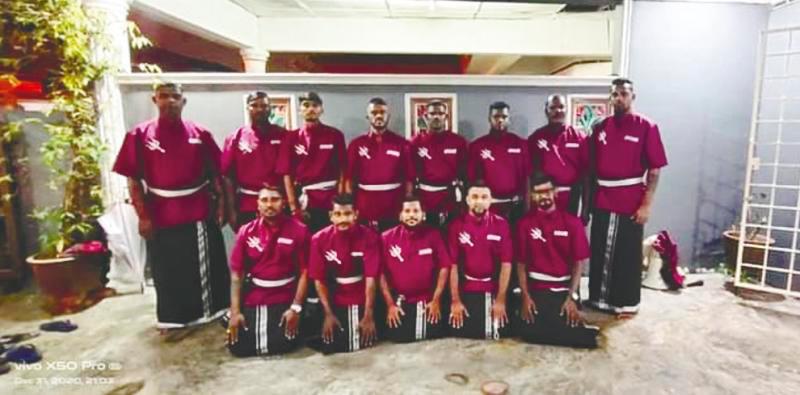
Does he have any advice for aspiring urumi melam musicians? Dharshen said: “Don't let our cultural music end with this generation. Don't be shy to ask and learn at any chance you get. You can do it yourself as long as you have the passion, the interest to learn. Take small steps, you'll get there in no time.”
We also spoke with Veeran, the founder of another urumi melam ensemble, the Om Sri Sadamuni Urumi Melam Team, which was started in 2004.
Veeran confessed: “Back then I didn't know anything about urumi melam.”
At the time, he had heard of someone wanting to start a group in Batu Belah, Klang. Veeran decided to learn the instrument, and was taught the techniques of playing from scratch, and even provided with all the necessary equipment.
Veeran added: “Because I saw [my seniors] doing so well, I was inspired to do even better.”
After learning everything, Veeran said: “I seized the opportunity, and with friends who also had a desire to learn as my support, we decided to form our own group called Om Sri Sadamuni Urumi Melam.
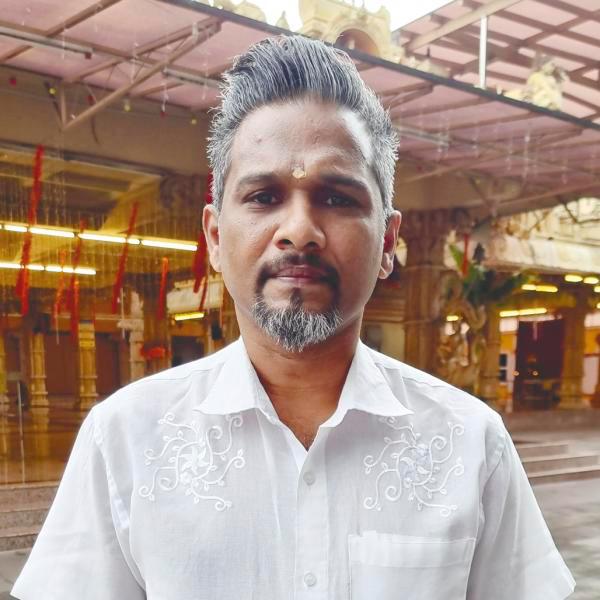
“Our group has no leader; we work as a group. We are extremely grateful to the people in our neighborhood who began providing us with opportunities to showcase our team's talent at each event.”
Despite their enthusiasm, things were not easy for the group at the start. “Our boys faced more challenges because some of them were studying and others were working, and they were sacrificing a lot of their time to come over for practices and events even if it was late at night.”
Veeran said that one heartbreaking moment was when his senior Sivakumar passed away. Sivakumar was the one who taught him the basics of the instrument. Two other original team members also passed away in the intervening years, and it is in their memory that the team is carrying on.
Veeran also explained how the urumi is played. The urumi is slung across the drummer's shoulder and played horizontally. This simple harness allows the drummer to play while standing or walking.
The drum can produce five basic sounds: an “open sound” is produced by striking the right head, a deep resonant “moaning” sound is produced by striking the right head while simultaneously rubbing the left head with the edge of a long curved stick, A bent “talking drum-like” tone is produced by striking the right head while the left hand squeezes and releases the rope holding the heads together, and two closed (non-pitched) sounds are produced by striking and pressing the right head.
Castor oil is frequently applied to the left head to help the drummer produce the “moaning sound” described above.
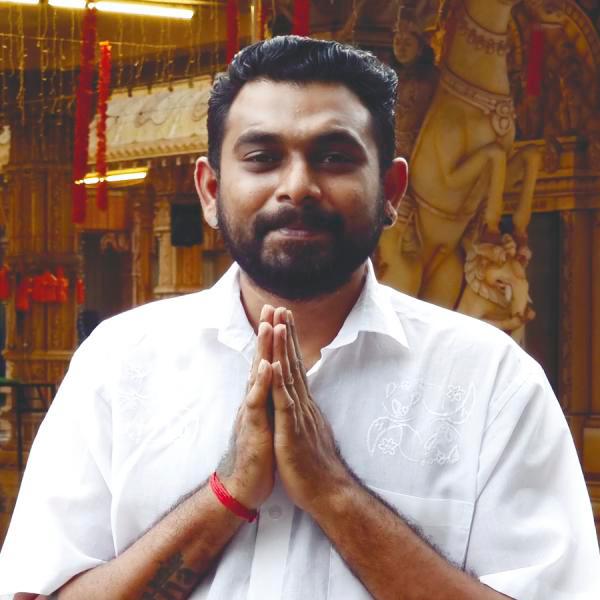
The team's most notable achievement to date was their participation in a competition held in Melaka, where they won an award for the best traditional outfit by an urumi melam group. They also released an album in 1997 titled Om Sri Sadamuni Vera Ganapathy . They also released a single track, Muthu Muthai Uthithavale , in 2020, which became their biggest hit.
Veeran said: “Due to the pandemic, Thaipusam celebrations have been reduced for the last two years. However, the festivities are back in full swing this year. I've had a lot of bookings, especially for urumi and thavil drums.
“[I can't wait to beat] the urumi as the devotees chant 'Vel Vel' as a massive crowd pushes forward towards a cave high in a cliff above. As you sway in the intense heat among the crowd, it feels like a dream. We can't wait to get back into action.”
You can watch the members of these two groups perform for Thaipusam. Tirusali Aiyanar Urumi Melam will be performing at the Sri Maha Mariamman Temple in Buntong, Ipoh on Feb 4 and 5, while Om Sri Sadamuni Urumi Melam will be performing at Batu Caves during the Thaipusam Festival there.



